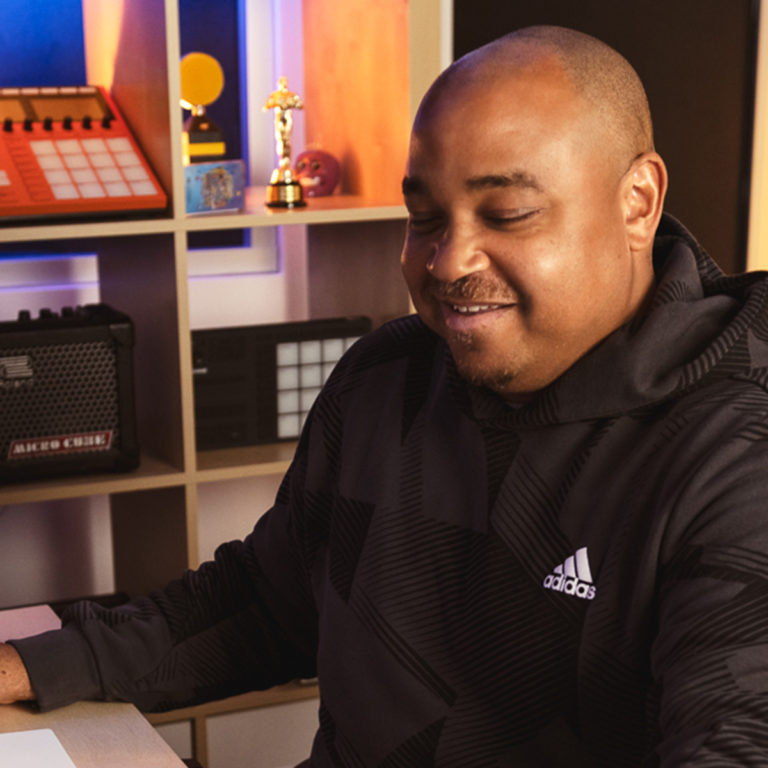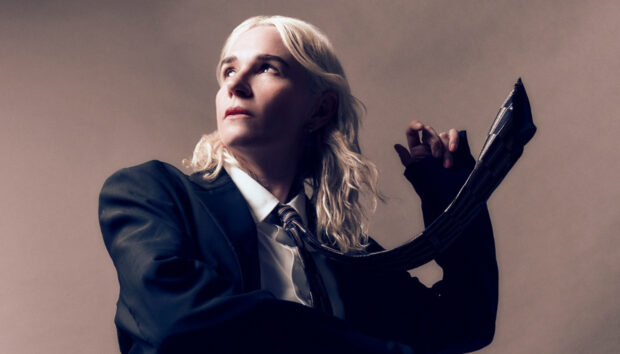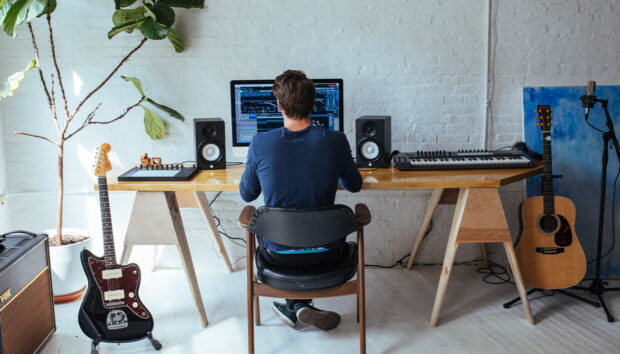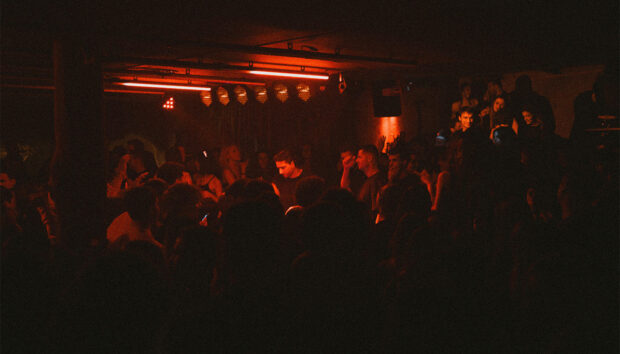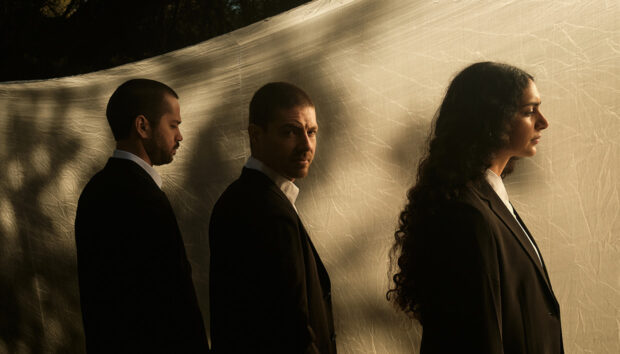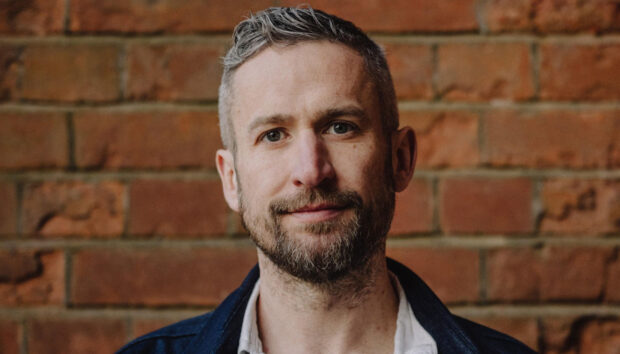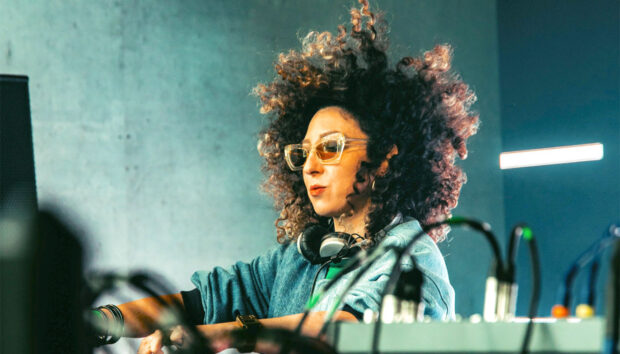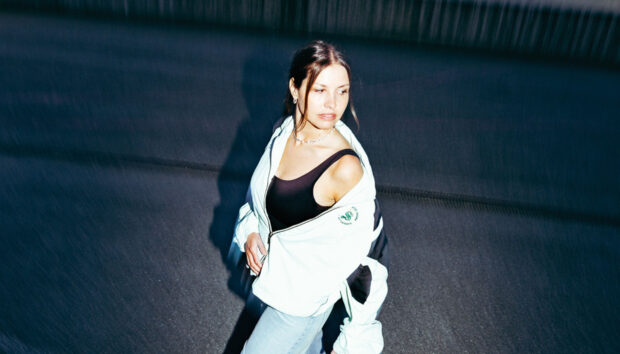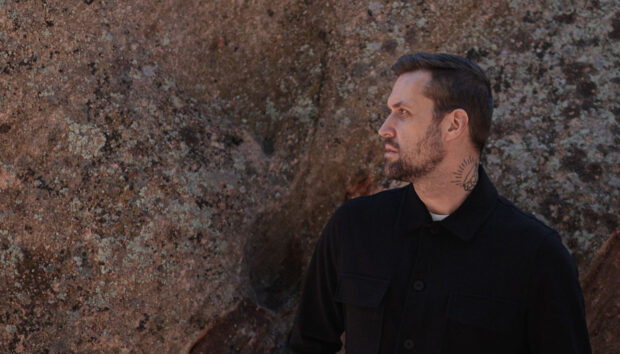West Coast legend DJ Khalil is not one to be flossing in gold chains on the ‘gram – despite being a go-to producer for some of the biggest names in hip-hop, Khalil keeps a low-profile. His list of accomplishments is anything but humble – a three-time Grammy winner and multi-platinum producer, his credits grace hits from Eminem, Kendrick Lamar, 50 Cent, Nipsey Hussle, Aloe Blacc, Drake, and the list goes on.
At the 2022 Grammy Awards – presented this Sunday, April 3 in Las Vegas – Khalil is up for Record of the Year (“Freedom”) and Album of the Year for his work on Jon Batiste’s We Are, as well as joining the 20-plus songwriters and producers who worked on Kanye’s opus DONDA, which is also nominated for Album of the Year.
[Update: Jon Batiste’s We Are won Album of the Year and Kanye West won Best Melodic Rap Performance for “Hurricane,” which Khalil helped produce. Find out more below.]
On a recent episode of Real Talk – our Instagram Live show with Vivian Host aka Star Eyes – Khalil dropped some science about working with the biggest in the game, explained how he creates samples from scratch, and gave out some major production keys.
Watch the entire Real Talk below, and read on afterwards to find out more about Khalil’s collabs and production tips.
Vivian Host: What was the turning point when you started making your own samples, instead of always sampling other people’s records?
DJ Khalil: After G Unit put out Beg for Mercy was the time I was really forced into figuring out another way to be creative without having to sample. At the time I was sampling a lot of European prog rock records. On “Lay You Down,” I used this sample of a group called Klaatu. When you have to license a sample, you’re at the mercy of the record label and the publishing, you know? They can take 100% if they want to – it just depends on how much of the record you use. When our manager at the time told me how much money I could have made off of that record I was in shock. So it really kind of forced me to think about how I’m producing in a different way. With my group Soul Scientific, we were already using live instruments and stuff like that, but I just felt like it was time to take it further. So I just started buying gear – I bought my first analog keyboard for $150 at Guitar Center and just taught myself how to play. Then I started adding more effects, plugins, that kind of stuff. After maybe six months of doing that, I got pretty good at making original stuff; and I started placing more records that I was playing on myself [instead of using samples]. After that, I started working with more musicians and keyboard players and that turned int jam sessions and then that became a big part of the process.
For a long time, I would just read the back of the records I liked and try to find the synthesizers and all the stuff that they used, and just try to literally mimic what they were doing. Like, let’s try to make a prog rock song, you know what I mean? I just tried my own version of it and once I had the right musicians and the right instruments, it started working.
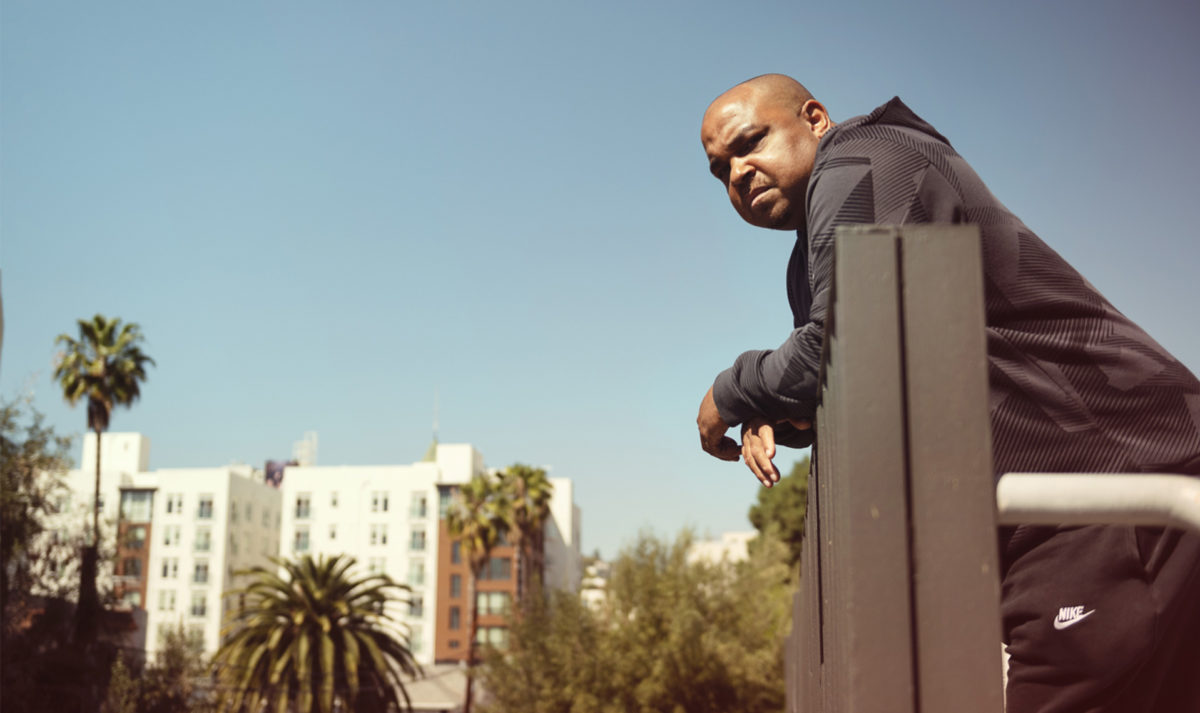
Tell me a bit about what went into making the DJ Khalil Artist Expansion and what sort of sounds you wanted to give people.
It ranges from jazz to classical to funk. All these different things that I grew up sampling, I wanted to put that into the Expansion; the stuff I grew up on, listening to Dr. Dre and Battlecat, DJ Quik, Pete Rock, DJ Premiere. I feel like I’m a blend of both coasts in a way. Most of my time [in creating that pack] was dedicated to doing jam sessions. I had my whole keyboard set-up and we would jam for hours and then I would literally go through everything, arrange it, EQ it, tweak it. That’s been my process since 2006 or 2007. When it came to the Expansion, I wanted to give people new sounds but with that same real emotional feeling. So when people hit those pads on the MASCHINE or whatever they’re using, they actually feel something. All the textures and all the things that I’m using have a purpose – I don’t want to give people just something that’s just kind of ambiguous and not really useful. And I wanted people to hear something that they never heard before, so that was a big goal.
What’s some advice you have for people who are maybe using sample packs right now but they want to move more into sound design and making their own samples?
It’s really just studying – I mean like studying records, studying sounds. When I think of some my favorite records that I’ve ever listened to, whether Stevie Wonder or J Dilla, I’m hearing something I’ve never heard before. Studying those things and trying to understand, ‘How did they get that?’ You don’t have to have a million keyboards. I had a whole studio of analog synthesizers but when the pandemic hit I had to move out of my studio. And I had to literally start over in the box. I went through a million different plug-ins and it forced me to think of creating differently. I scaled everything down and now when I work I maybe have three synths. I feel like if I have the right combination, that’s all I really need.
But I think it’s good to learn the basics. One of the first things I bought was the Korg MS 2000 and I learned how to tweak oscillators; this is a square wave, this is a triangle. Once you get that knowledge, you can tweak any synthesizer – they’re all based off the same premise, really. Learn little by little and build it out. What I have now is from years of collecting, but I feel like I had to graduate into each synth to really understand how to use it and get the full capability. Start with one thing and learn that. Don’t always think that you know everything. I love learning. I’m learning so much every day. I did a session yesterday with Beat Butcher; we were making samples and he was showing me so much stuff, I was blown away. But I think that’s what some of the greats like Dre and Kanye have in common – they don’t stop learning. They keep creative people around them and they absorb the information. So every day – even if you’re having a beat block or whatever – just go learn one thing. It pays off in the end.
On that note, I wanted to talk about some of the talented people you’ve worked with over the years. Since you’re up for two Grammys with him, tell me about working with Jon Batiste.
I met Jon through Aloe Blacc years ago. He came to my studio and we hit it off – we did the most amazing jam session that led to another session and we were both fans of each other. Shortly after that he started working with Steven Colbert and his career just took off. I hadn’t seen him in a while and then during the pandemic his camp reached out to me because they were working on his album and they were having trouble finishing some songs. The first song they sent me was “Freedom.” The song was written but they needed more production; it needed more drums and it just needed a lift. This was literally when the pandemic first happened – I was working at home on my headphones, my kids were jumping on me, there were riots in the streets. I would talk to Jon and he would give me his thoughts on what he wanted.
I was just glad to be a part of the album (I worked on some other songs too) and I didn’t think anything of it. Then the Grammy nominations came out and he got 11 nominations, so I was like “Let me see what he got nominations for.” I saw Record of the Year and I was like ‘Damn, this is crazy!’ I’ve never been nominated for this category before so that’s huge. His manager called me and said “Man, this wouldn’t be Record of the Year without you” so that was incredible. I still can’t believe it, honestly.
Jon is such a good dude. He’s exactly how he portrays himself in his music, he’s such a joyful guy and very passionate about his music. He’s so eclectic, he’s influenced by every genre. His arrangements and how he approaches music is different than any other jazz artist I can think of. The song “Freedom” describes his whole being. When you work with him it’s just energy. He’s not looking for anything specific, it’s just about ‘Does this feel right?’ He doesn’t think in terms of boundaries, he really is a very unique talent. I’m such a fan of his, I’m really proud to be a part of it.
I imagine it was a bit of a different experience working on Kanye’s DONDA.
Yeah, last time I checked, that album had 24 writers on it and at least 6 or 7 producers! The original song “Hurricane” was leaked in 2018 as a song called “80 Degrees.” I had sent his team a folder of compositions that I had been making for years. This producer Nascent I know played one of the compositions for Boogz, one of Kanye’s producers; Kanye heard it and was like “Let me jump on that right now.” “80 Degrees” was just a demo – there were no words to the song yet. Kanye shot a video to him driving around in a sports car listening to it. At that point, the album was supposed to be called Yandhi. In true Kanye fashion, he kept pushing the album back for two years. Finally, he started doing those arena listening sessions and he kept playing it at those. There were all these different versions floating around out there; one with Big Sean, one with Lil Baby. At one show, he played the song and it was different – The Weeknd started it off. And everyone called me like “There’s no way it’s not going on the album.”
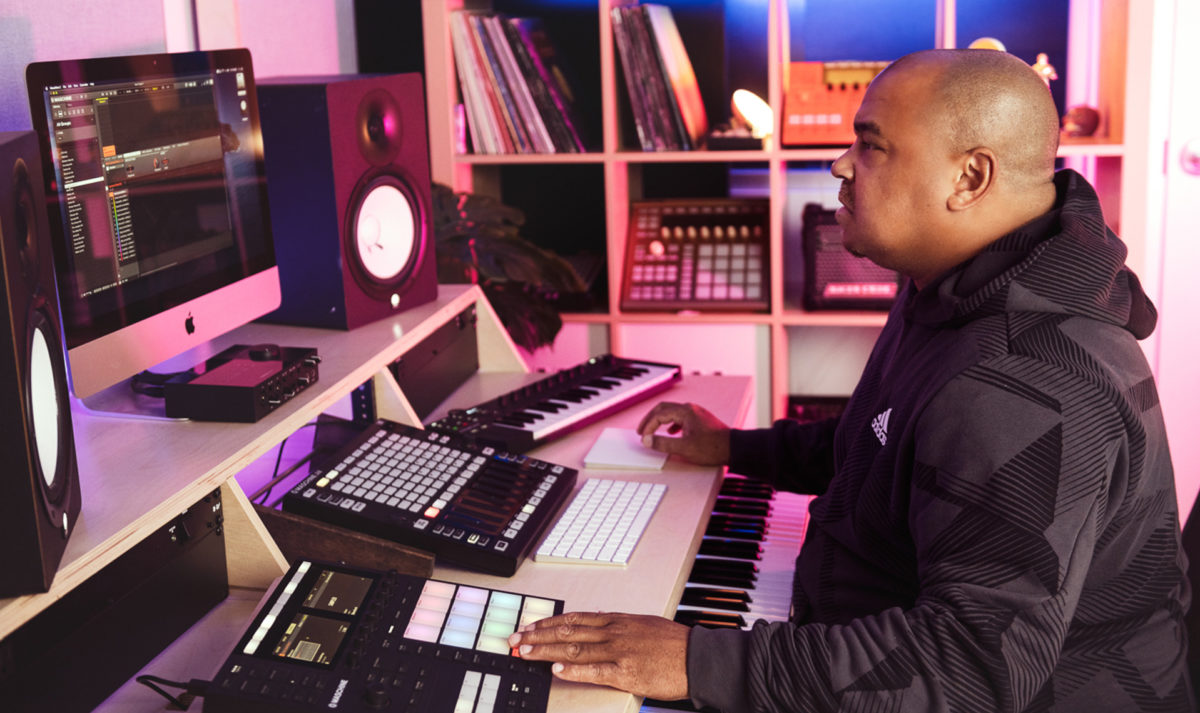
I’m going to take some questions from the chat. Carl Ellis Grant would like to know: “What’s a challenging moment that you had to push through musically that led you to making a hit?”
Not really a hit, but in terms of a record that was dead in the water and I had to literally figure out how to make it happen… I was working on a record with The Game that sampled Boyz in the Hood, the movie, and Sony wouldn’t clear it. So we couldn’t clear that, we couldn’t clear the movie, we couldn’t clear any of the dialogue. Anything, right? So, you know, when The Game told me that I was just like, “Ah, man, like, how are we gonna do this?’ The record was already done. So I literally had to like reimagine what the score was. With my keyboard player and a few other people that I work with, we listened to the score by Stanley Clarke, and we reimagined what he did, especially on this one scene where Cuba Gooding yells “Rickyyyy!” – you know, the big, climactic scene of the whole movie. We had to bring in actors, I had to send a script to Ice Cube and he sent me back lines from the movie that he did, which was totally legal. And we brought in other actors and redid the whole scene in my studio. I put saxophones on it, live drums, it was a full-on production. I just would not stop until I really finished and recreated it. And when I showed it to Game, he was like “Yo, this is ten times better than what we did” on the sampled version. That was a big deal for me because it proved to me that no matter what, like you can literally push through a record and make it happen.
And then also Aloe Blacc “The Man” – that’s one of my biggest records. And that took like, like four to five months to do because we wrote the song, then we had to recut it, then I went and recorded a choir up in Vancouver. Then the A&R people are chiming in. We tracked real drums, and then I programmed in drums and had to edit through everything just to make sure it lined up. It was just this whole thing, but it was worth it. That was in a Beats By Dre campaign which broke the record, and it was clearly a huge turning point in my career.
What’s your favorite EQ and favorite saturator?
The FabFilter EQ is really dope. But what I use is Screenflow in Reason, especially for drums. It has a three-band EQ in it and it’s like a distortion unit and a saturator in one – almost like a cabinet or a guitar amp. Anyway, it colors sound like nothing else. For my snares and hi-hats, it adds a grittiness to it that has really added to my sound. And then I’ll use the FabFilter or the native EQs that come in any DAW. That’s as far as I go – it’s pretty simple.
Do you have any Native Instruments effects that are your go-to’s?
Transient Master! That’s my go to. I use that on everything, for every drum break that’s the first thing I go to.
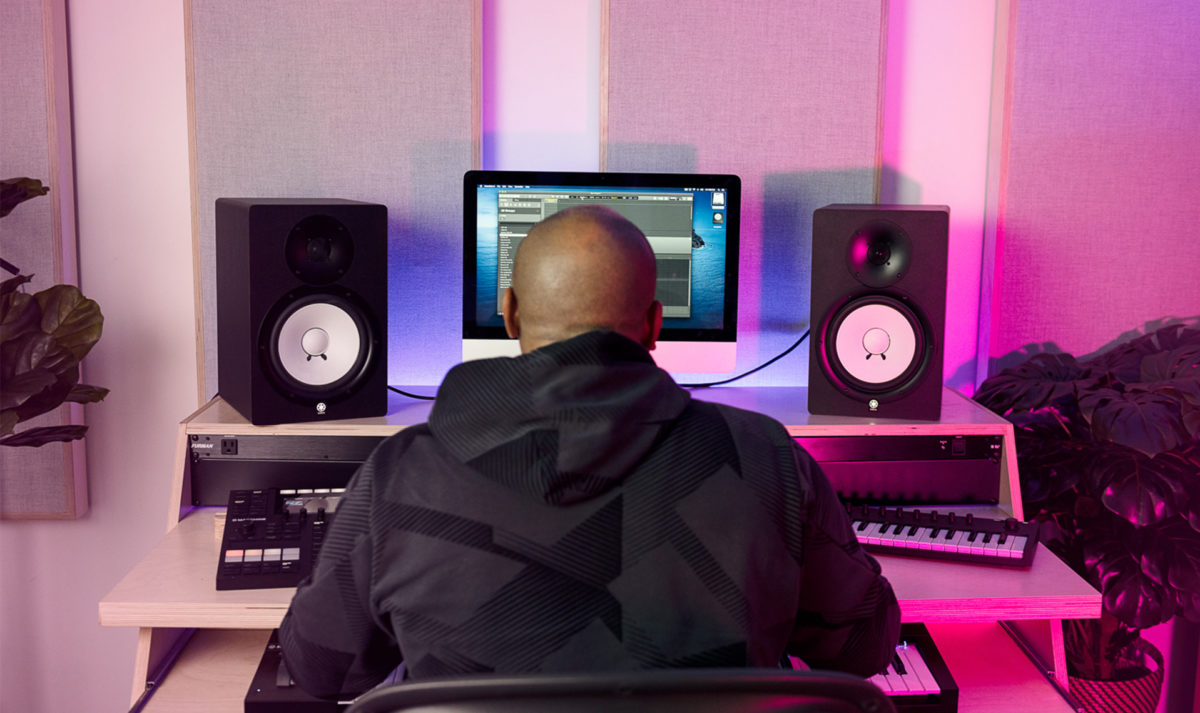
You’re doing studio sessions right now with Schoolboy Q and all sorts of folks. What are the music trends you’re seeing right now?
Artists are cutting songs to loops now or even samples, more than actual beats. On the production side, they don’t want too much going on or they want to do it from scratch, which is what I do most of the time. If they like the music, they don’t want the drums and all that and I think it makes for a better song. I feel like people are more in tune to making songs than worrying about what the beat is going to be. I think Drake is a master at that. He’s a master of space and melody; there’s not a lot going on in his beats, but it works.
Does that make your job easier or harder?
It’s different. When I think of Dre or anyone from his era, you had to make the song right there. It was staying in the studio until the song was done. I feel like that urgency is created some of the greatest music ever. Technology is convenient now because we can do an idea and easily come back to it. But does that mean we’re making better music? I don’t know. There’s incredible music being made now, but people are approaching production differently. They might just leave it with no drums or figure out a new way to do drums. Every beat that I made 10 years ago had a super loud snare with a reverb on it. You can’t even do that now. But it’s all about being able to adapt, and it’s still all dope music. It’s just trying to figure out how to make the best song. And that’s really it.








